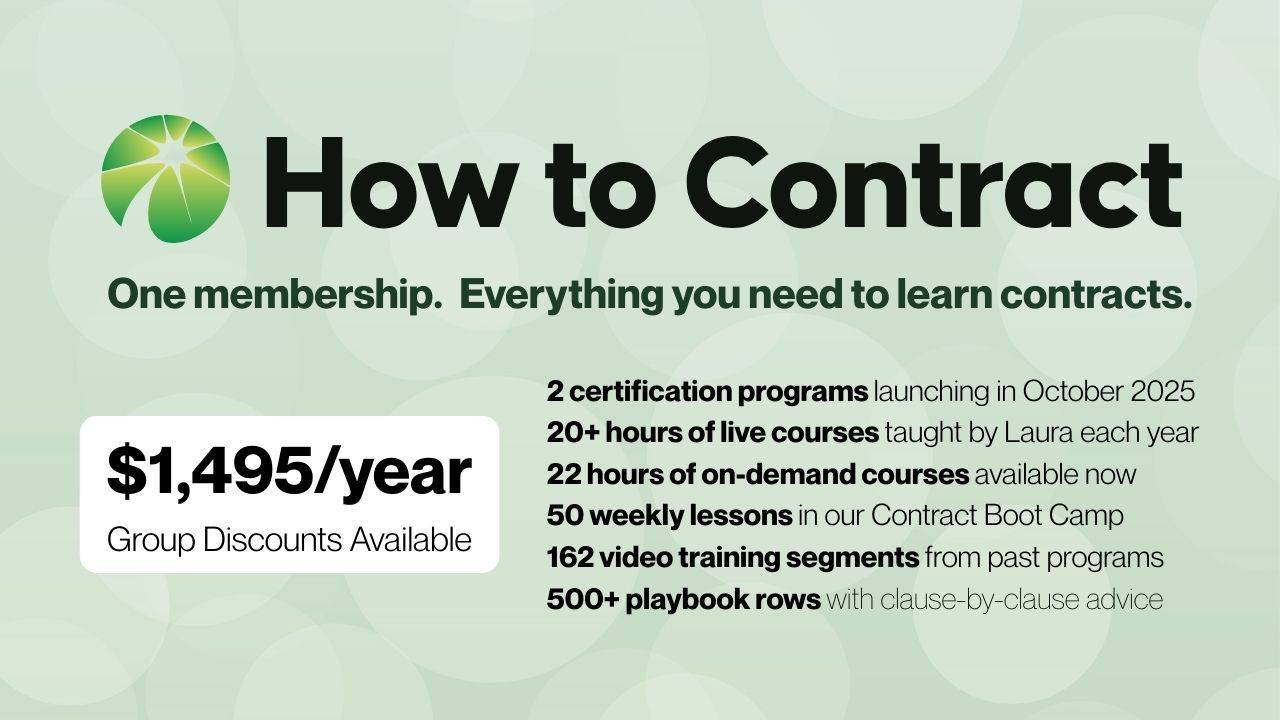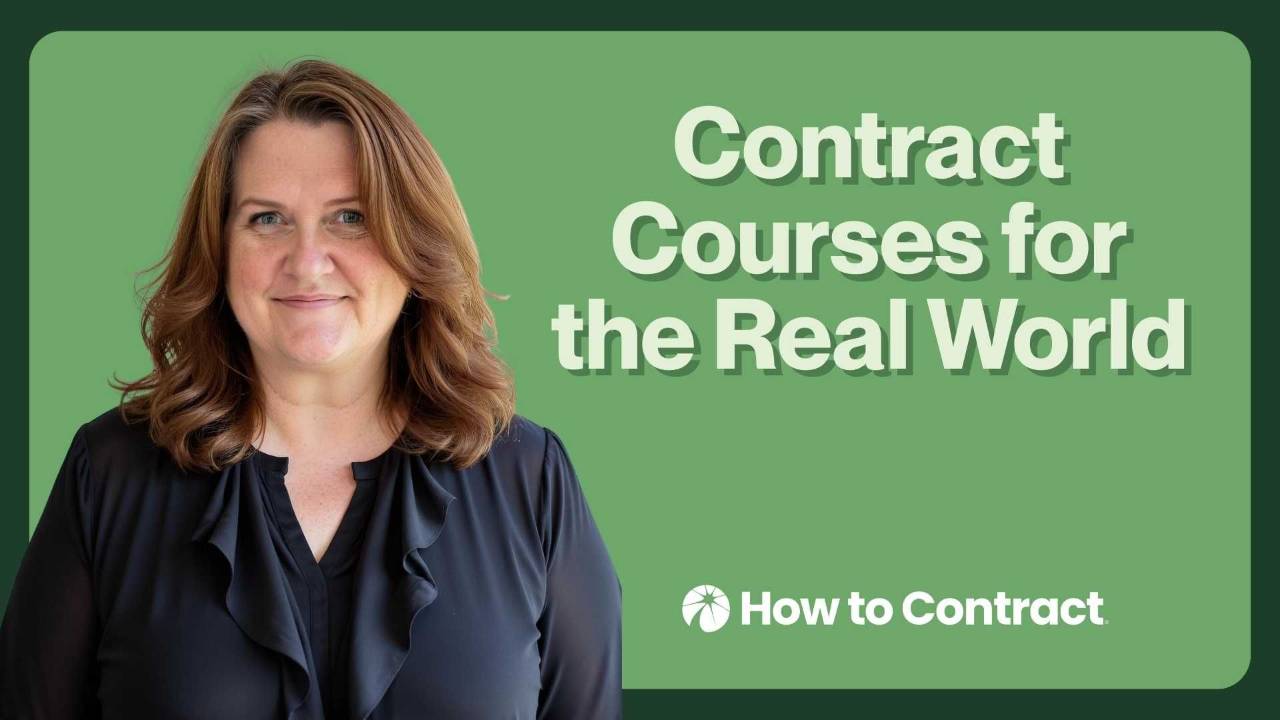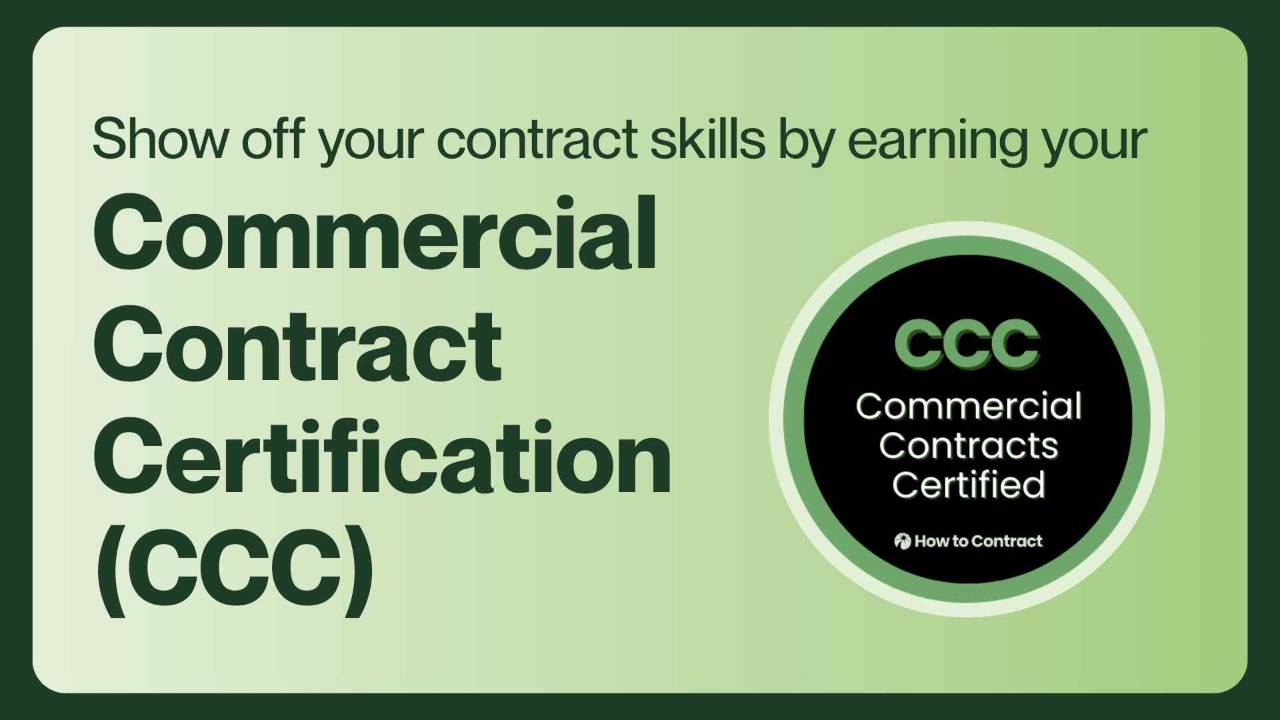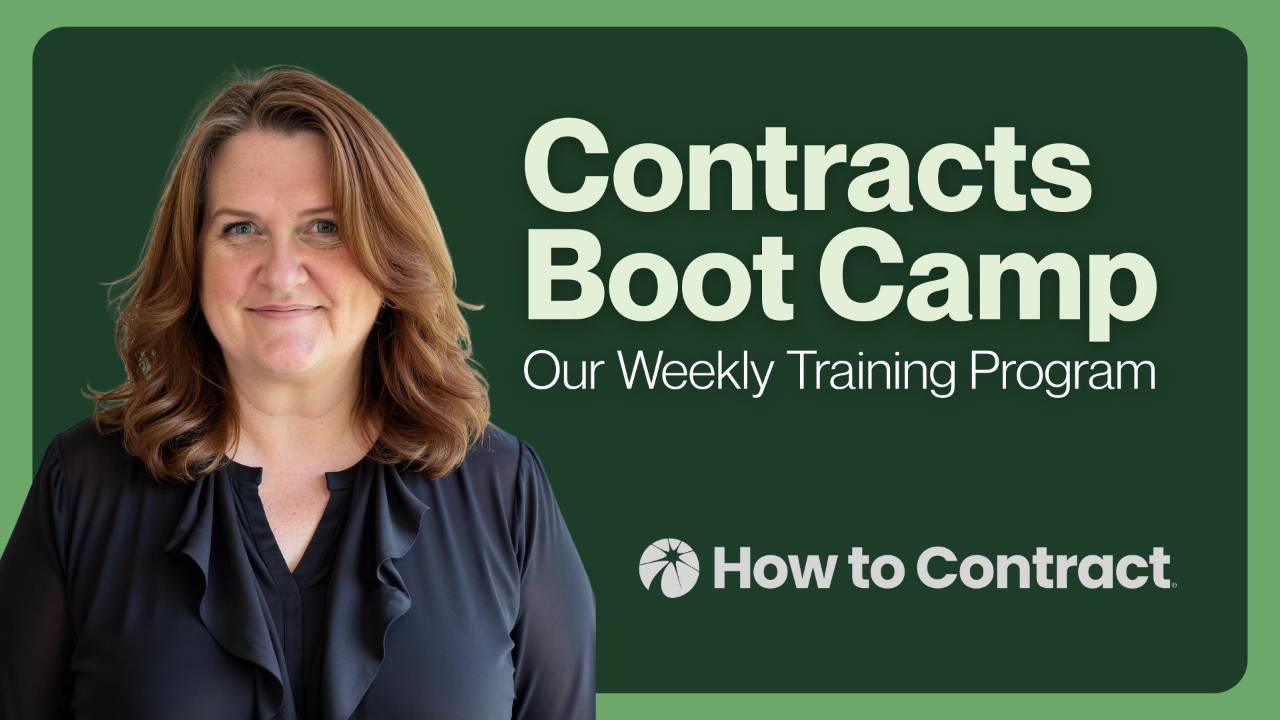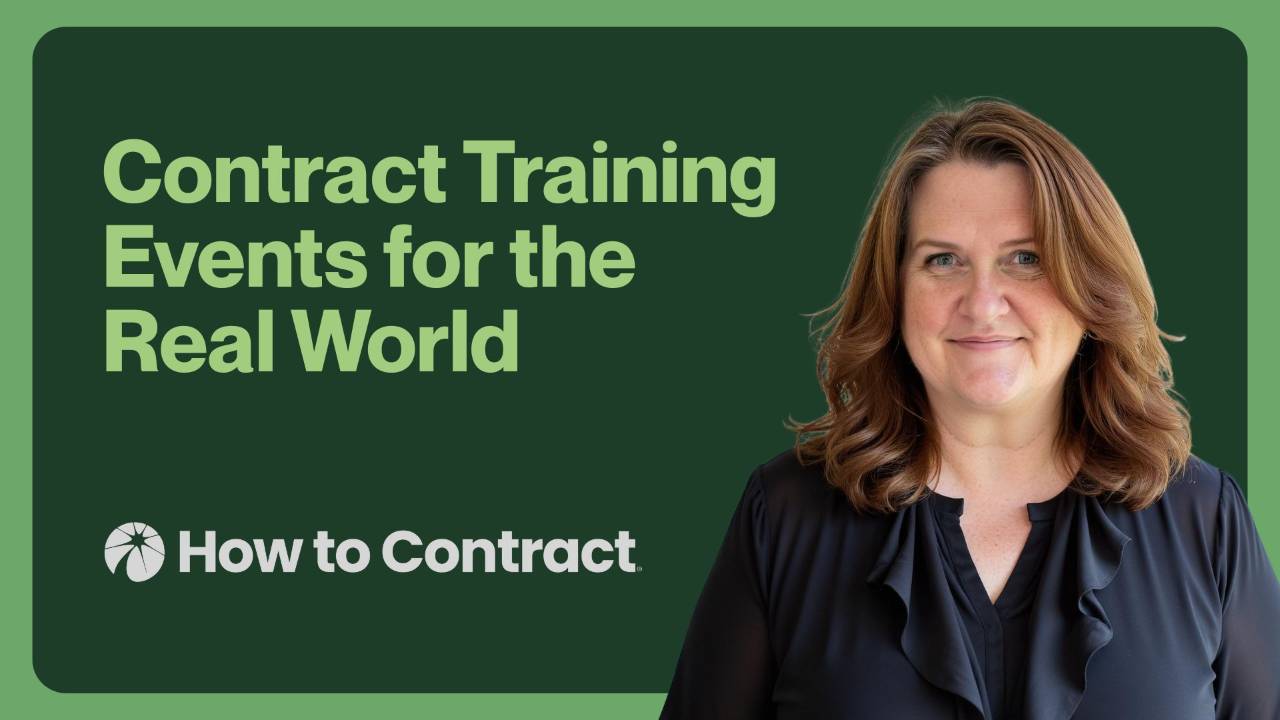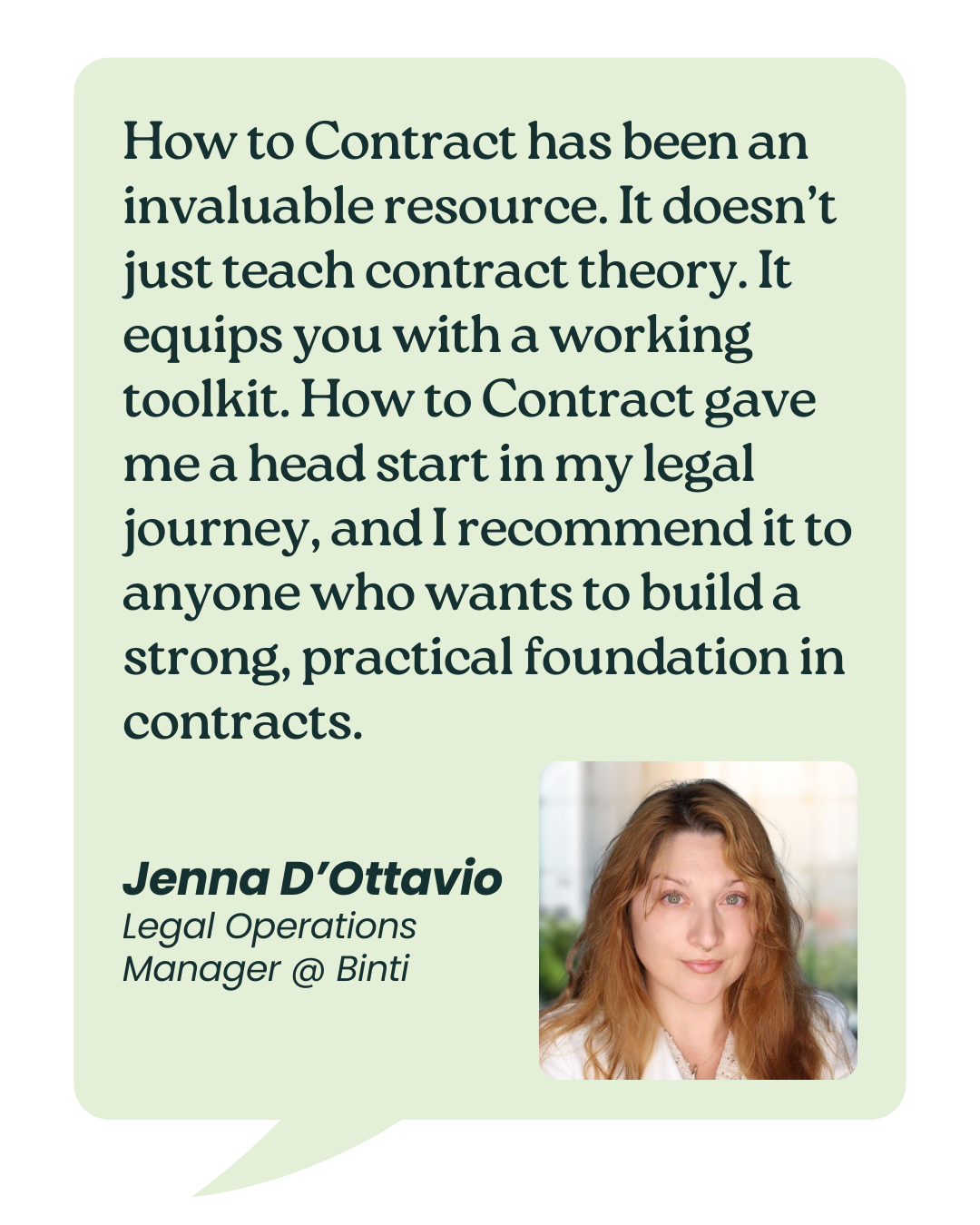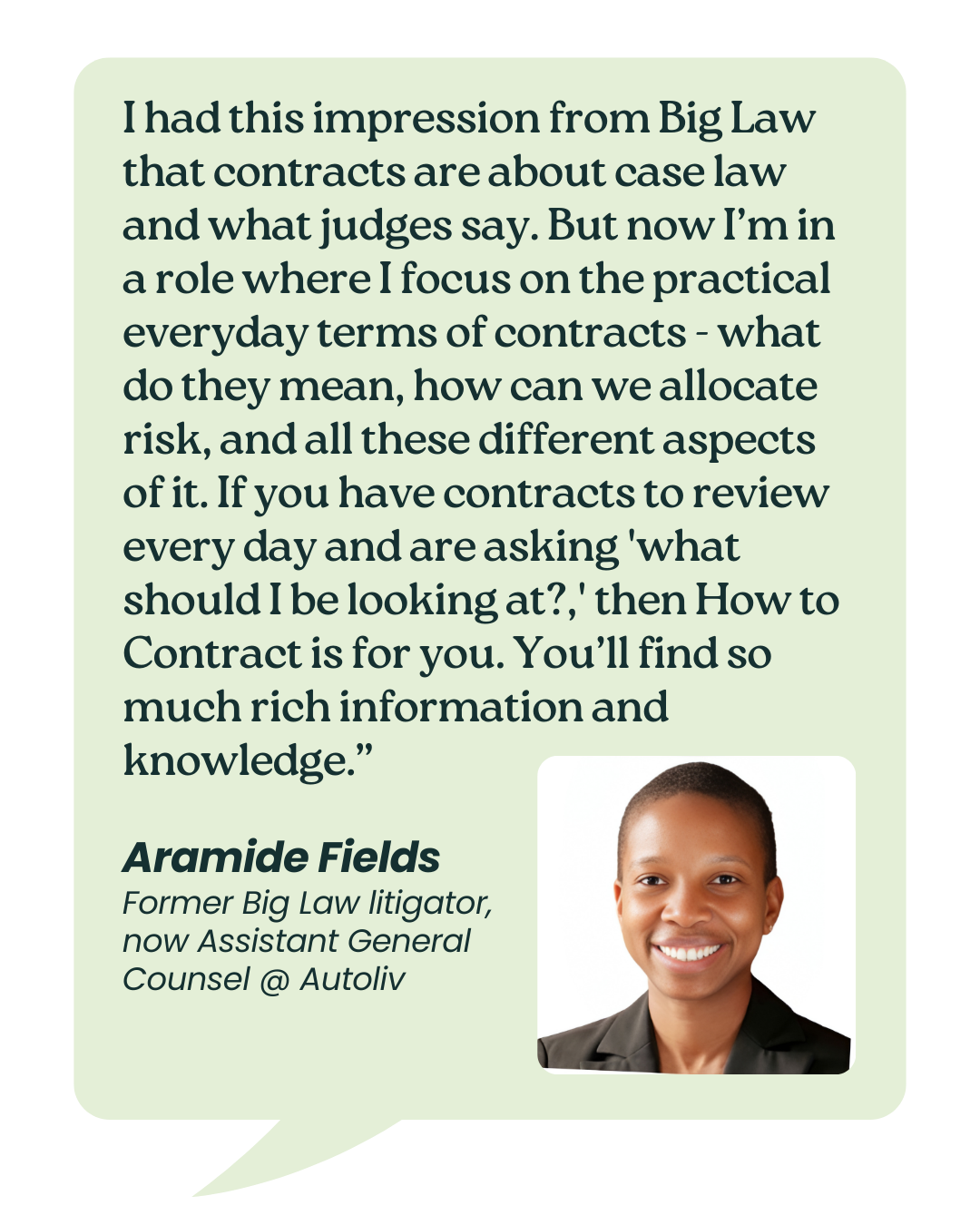
Laura Shares Her Story on the Maximum Lawyer Podcast
In today’s episode, Jim and Tyson chat with, Laura Frederick! They dive into the journey from opening her own firm to contracting. If you’re interested in learning more about the importance of building your online community, contract drafting, and negotiation, check out this week’s episode.
Laura is the founder of How to Contract, a digital learning hub that helps lawyers and professionals master contract drafting and negotiation skills. She is an ex-Tesla and ex-Morrison & Foerster lawyer with over 26 years of experience, a bestselling legal author, and a LinkedIn influencer.
2:37 international contracts
6:25 time management
9:45 opening my own firm
13:37 contract tips on LinkedIn
17:14 personal contract playbook
21:07 magician’s tricks
24:23 ask me anything call
Jim’s Hack: Take your one-star reviews to your community and ask them to help you out by leaving a five-star review. Taking one negative review and turning it into more positive reviews.
Laura’s Tip: Use LinkedIn to give all that you have to give. Help people, add comments to other posts, answer questions, etc. Do as much as you can to benefit others without expecting an ROI.
Tyson’s Tip: Check out the book, Damages Evolving by David Ball, Artemis Malekpour, Courtney Rowley & Nicholas Rowley. The approach they take is treating their clients as human beings.
Watch the podcast here.
Join the Guild: www.maxlawguild.com
MaxLawCon tickets are on sale now! Grab your ticket today at www.MaxLawCon2022.com
Jim Hacking: You’re listening to The Maximum Lawyer Podcast. I’m Jim Hacking.
Tyson Mutrux: And I’m Tyson Mutrux. What’s up Jimmy?
Jim: Good morning, Tyson. I am reporting live from Holland, Michigan. I am getting ready to come back to St. Louis tomorrow. The place where we stay in Michigan is where L. Frank Baum wrote The Wizard of Oz. It’s based on a little girl he met, here in Holland, named Dorothy. There’s a little boardwalk that I walked on yesterday. It was very cold. But I am taking the same train that he took to Chicago and then I’m going to fly home after that. So, I’m very excited because I’m a big, big fan of The Wizard of Oz.
And for those of you who don’t know, I once played the Scarecrow and sang a song that, if Tyson could find the footage, he’d be very happy of because it’s called If I Only Had a Brain.
Tyson: Oh, this is fantastic. You could have said his name. I would have known who he was. So, I’m glad you said who he was. So, that’s cool. Very interesting.
All right. Well, let’s get to our guest today, Jimbo. So, our guest today is Laura Frederick. Laura is a former Tesla and Morrison&Foerster lawyer with 25‑plus years of experience who teaches lawyers real world contract drafting and negotiation tips. In 2020, Laura self‑published a book on contracting. It has become Amazon bestseller and it has been embraced by several law schools and law school professors which we will get to in a moment.
Laura, welcome to the show.
Laura: Thanks. Thank you so much for having me.
Jim: So, Laura, usually, we like to ask our guest to tell us a little bit about their legal history and their path to where they are now. You have quite an interesting story so I think our listeners are really going to like hearing it. Why don’t you tell us a little bit about what’s happened in the 25‑plus years since you graduated law school and sort of what your path has been until you got to How to Contract?
Laura: Sure, sure.
So, I graduated law school in ‘93. And then, I knew I wasn’t ready to quite jump into practicing law at the time so I took a year off. I did a Fulbright grant up in Canada. So, I spent a year in studying international commercial dispute resolution. And then, after that, it was still in a recession, I wanted to focus on international contracts. That’s been a passion of mine my whole life. And so, I started working in international franchising. That was the only job I could get, back in 1994, when we were still– you know, the economy was still reeling. So, I did that for a few years and then moved over to tech transactions. I was able to ride the bubble up for the dotcom boom and deal with 1999 and year 2000 issues. And then, I ended up practicing that in law firms for another six years, including at Morrison&Foerster. And while at MoFo, as those who know it, that’s the short name. While at MoFO, I was based overseas in Hong Kong and Singapore for about two and a half years. So, that was a big highlight of my career. Came back and went in‑house in 2005 for an energy company. I did a lot of different things for them, ended up getting into renewable energy, worked in a lot of different companies there. Then, Solar City, which was later acquired by Tesla, where I stayed for a few more years.
And then, in 2019, I realized it was time to try something new. I was ans– I loved working at Tesla so much. It’s really my favorite job of my career but something was missing. So, I said, “You know, I want that control. I want that freedom.” So, I quit and opened my own firm. Had eight months of money in the bank and I figured, “Okay. If I can’t make any money at six months six, I’ll go find a job.” So, I left with no clients, no nothing. Even Tesla, you know, wasn’t able to hire me right away. So, it was a leap in the dark, for sure.
And then, fast forward about a year and a half, my firm’s trucking along. It’s doing well. And then, I started posting, on a whim, a contract tip every day on LinkedIn. And there was a huge interest in it because it was so much more than just “do this.” It was do this but then lots of discussion with experienced lawyers, lots of questions, lots of engagement, often 50, 100 comments, back and forth, on each post talking about the intricacies of each point. And so, that kind of ballooned.
And then, I had always wanted to do more training, so I created a training business. And then, that’s taken off like crazy over the last year and a half. And we had a big conference in January with 350 people, paid for tickets, which I thought was a huge thing for our first one. And I have a membership and we have courses and, you know, lots and lots of things now to offer practical training to lawyers and professionals.
Tyson: It’s very good. A lot to unpackage here.
With all of that, actually, I wanted to talk about the beginning of the firm but I’m going to get away from that for a second. I imagine that managing your time is extremely, extremely important with everything that you’ve got going on. So, I just want to talk about that for a second. Let’s talk about time management. How do you manage your time to make sure you’re able to do all these things effectively?
Laura: Yeah.
I think I was one of the people who the pandemic helped tremendously. I don’t know that I would’ve followed this path over the last year and a half without it because I’m also a single mom with four teenage kids. And before the pandemic, you know, I had three roles. I worked. I was mom. And I was taxi. So, that was– my life was filled with driving people everywhere. And then, the pandemic happened and, all of a sudden, all that taxi time was free. That’s really a lot of what I did.
So, for now, I just really focus on doing what I can do and outsourcing as much as I can to other people but really keeping the core of what I do. And one of those things in time management, a lot of people say, “Oh, but you must– you know, how much time do you spend on social media? That’s a big waste of your day.” But, in reality, for me, that’s the most important part of my day because that’s engaging with my community. It’s engaging– you know, I look at it as my social time. I get to talk to my friends and nerd out on contracts. I get to see what people are doing. You know, it’s the fun time but it’s also where I build my community, I build my network, and I kind of–I reinforce that I’m a go‑to person for contract training.
Jim: So, you’re working at Tesla, and you’re partying with Elon Musk, and this– this–
Laura: But not that kind of partying, no.
Jim: Right, for sure [laughter].
Laura: I want to be clear. I want to be clear.
Jim: The seed comes in, to your head, somehow, of going out on your own. And so, what I’m wondering is, what was the seed? How did you water it? And then, once you went out on your own, were you worried that it wasn’t going to grow?
Laura: Yeah. So, the seed was the fact that I wasn’t happy despite having everything I ever wanted. You know, it was– here, I was working in the coolest company. I was working on this very niche thing of global environmental commodities so zero emission vehicle credits, greenhouse gas credits. I was the lead lawyer for the company doing all those things. And I had this great team who I adored and would do anything for. It was just a wonderful experience, but it wasn’t enough. And there was something like, “Wait. I’m not fully happy.”
So, I spent actually about a year kind of exploring, “Well, maybe it’s not the right place, maybe I’m just– if I found the right place, and I interviewed, and I, you know, got a new job, that would be even better, that would be a better fit and make me happy.” So, I started interviewing and I just found nothing really was that– you know, nothing was better. And I thought, “Well, but I’m still not happy, so maybe what’s better is not this.” This court– I’d been in‑house for 14 years, maybe it was something different. And I started to look at the idea of opening my own firm.
And so, like I said, it took about a year. And it was a lot of self‑reflection because I didn’t want to take that leap, if that wasn’t the answer. I didn’t want to do that and then turn sideways and go get a job a month later. Although totally fine for people who do that, but I really wanted to make sure it was the right leap. So, a lot of self‑reflection.
One of the things somebody said to me was, “Come up with your one word.” And this actually was a big part of that year. And they said, “What’s your one thing that your life goal that you need– not really a goal, but you need more than anything else?” And I’d say, “Well, I want a lot of flexibility with my time. I want to be–” you know, blah, blah, blah. And he’s, “No, no, no. One word.” And I’d say, “Well, you know, more–” whatever. And I kept coming and he kept saying, “No, no, no. One word.” So, I got down to one word which was freedom. And freedom was the word I wanted – freedom to pick the clients, freedom with my time, freedom to define my destiny. And then, once I kind of settled on that word and that concept, I realized the only way to get that freedom was opening my own firm.
And so, the biggest thing that helped me push myself over the edge, you know, flailing off the cliff with no parachute, was I looked back at my life and I said, “You know, I’ve been successful in my life. I was good at school. I was good at law firms. I was good in‑house. You know, I’ve done well. What about that history makes me think I’ll fail at this?” You know? And I kind of realized I trusted the fact that I’ve been able to make a success out of different things in life and certainly had my share of failures too but, generally, an upward tide. And I thought, “I can do this. Even though I have no idea what I’m doing, I can figure it out. I’m smart. I’ll work hard. You know, I’ll make it a success.”
Tyson: So, I wonder– now, let’s think about like the six months after you’d lost the firm, right? And I just wonder like did any doubts creep in at that point where you’re thinking like, “I kind of miss what I was doing before. I want to go back to that.” Did any of those thoughts creep in? And, if so, how’d you deal with it?
Laura: Not once, I’ll tell you, because–
Tyson: Yes.
Laura: –it was– and for people who have not opened their own firm, you know, it is the Nirvana that you didn’t realize existed because– especially for people who, you know, have gotten to a point– at least, I think it’s a lot easier for people who are at kind of at my end of the career where you already know all the stuff of how to do the job and then it’s just a question of setting up a new business arrangement. Instead of doing it for an employer, you’re doing it for clients. So, it’s an easier leap, I think, for people who have that history.
So, I did. And I knew a lot of people because I’ve been practicing law for 24 years at that point. So, those were the people, for the first, really, year and a half, they kept me busy. I had little periods of dips and, you know, maybe not as busy but I’m scrappy, I’m hard working, and I found people who needed lawyers for 20 hours a month, 30 hours a month, and I did those at a lower rate to kind of fill in the gaps until I got more clients, and higher billable rates, and was able to sustain myself.
Male: Have you ever felt overwhelmed with everything there is to do within your legal practice? How do you keep up with your legal work while making time for growing your practice and attracting clients? Do important things like deadlines and even your family fall through the cracks? This is why you should join us at the number one conference for legal entrepreneurs, MaxLawCon.
We’re going to be focused on helping practices scale and bringing calm to the order. This conference is curated in order to accelerate your implementation. Based on where you are in your legal practice, we’re going to help you identify exactly what is most important right now.
When you leave MaxLawCon, you go home with complete clarity, focus, and a plan to make 2022 your best year ever. And not only your best year in terms of revenue, but your best year in terms of time – time back with your family, more time to do the work that is in your zone of genius, only taking the clients that you like, and more money in your pocket.
It’s all at the Maximum Lawyer Conference. MaxLawCon is a two‑day event on Thursday, June 2, and Friday, June 3, in St. Charles, Missouri. Seats are filling fast. Grab yours today at www.maxlawcon2022.com.
Jim: You’re listening to The Maximum Lawyer Podcast. Our guest today is Attorney Laura Frederick. She’s the founder of How to Contract. Let’s shift gears and talk about how to contract. What is it? How does it work? And how’s it going?
Laura: Yeah, it’s been tremendous.
So, it started with– as I said, I started posting contract tips on LinkedIn. People were really responding because one of the gaps for people who work in business contracts, commercial contracts, there’s a ton of information out there but very little that explains the practical. Everything’s– there’s cases that say this. There’s statutes that say this but when it gets to, “Okay. I’m looking at an agreement, a master supply agreement, in front of me and here’s the license section. What the heck do I do?” You know, am I supposed to keep that word? Do I change it? Do I– does it matter? My client’s this kind of thing or this kind of business, should I worry about this? You know, all that kind of stuff that would come from typically mentoring relationships at a law firm in the old world or in some– you know, the minority of lawyers now who get trained that way.
So, what I found, as a lawyer, there really wasn’t anywhere that had that kind of inside practical information. And so, that was really that gap in the industry I was trying to fill. So, I built this business called How to Contract with the goal of filling that gap, where I would actually explain to people, “Okay. When you get to an assignment provision, check for this. The first phrase, it should say something like this. If it doesn’t, do it this way. And if you worry about these things, add this.” That’s all that kind of stuff.
And so, the business really became a place that– and I designed it as a place that people could learn and, you know, not just a one and done course, sign up for four hours and you’re done, great, you’re perfect, because learning doesn’t work that way. At least, not this kind of learning.
So, I started and the main– the cornerstone of my How to Contract business is my membership. And I created a membership where it started out– for the first year, because I didn’t have the content. So, I had to force myself to create this content – all this training. And what I did was promise to my founding members, that I would supply one contract tool a week – a checklist, a negotiation script, a video, whatever it was and– you know.
So, I got to the end of my first year in March, this last March 2022, and had this wonderful library now of all those videos. You know, now it’s up to about 17 hours of videos. It’s 44 contract tools of, like I said, checklists, scripts, things like that. So, my members get access to all that plus other benefits as well. So, that’s the cornerstone.
And then, I’ve added in events. That’s the other big part. I’d say, now, it’s kind of 50/50 events and membership. And the events are the conference I mentioned before as well as webinars, and workshops, and anything where I can bring together other experts – people who– and when I say experts, I’m not talking about a lot of, you know, writers, or the professors. I’m talking about somebody who’s been in the trenches for 20 years, 10 years even, doing this kind of stuff.
Tyson: So, one of the questions we get all the time and it’s about how to create content, it’s usually about videos, or blog posts, or whatever. Like you were going a step further and you’re creating content, but you’re also creating like tools that you could use which is even more challenging. So, where did you come up with those ideas because that’s quite intense?
Laura: Yeah. No.
Well, the good thing is I’ve been collecting this stuff for most of my career. So, I am a proponent of something called a personal contract playbook for anybody who works with contracts. And this is where you collect the kernels of wisdom that you come across over your career. So, I might be– you know, see a blog post that says, “Do these four things when you’re going to terminate a contract, or here are some arguments you can make when you’re negotiating an indemnity provision.” And what I did– you know, I wish I’d been even more religious, but I was pretty careful to collect those things
So, I have this 200‑page Word document because it’s old school and it’s, you know, there when I need it. So, if I have an adequate assurance, under the UCC, I can go in my workbook and there’s a two‑page memo that a law firm wrote about 10 years ago, and I dropped it in there. So, it’s just a great way to collect it.
So, I took that as kind of a basis. But I’m also the practicing lawyer. And I’m a student of the practice in the sense that I view drafting and negotiating contracts like a mechanic working on cars. There’s a process. It’s not just a painter coming in looking at a canvas, “What shall I do today?” It’s, “Okay, you’re in section one on purchase orders. This should cover these seven things. And, if you’re this kind of business, you should add these other two things.”
So, I view it mechanically already. And I think that really lends itself to creating these checklists – mechanical approaches to what some view as this kind of a morphous, unbounded task. Whereas, I see it as, you know, thousands of points that you should know in order to do the task. And all of us just know parts of those thousands of things, but we keep learning, and growing, and getting better. And that’s kind of the career and joy of doing contracts.
Jim: I love this. I love this because we hear so often from people, “I can’t scale what’s in my head.” I mean, they do sort of think of themselves as legal artists and like that it’s not systematize-able. And so, I love that you’ve done this. What arguments do you have to help us try to convince people that it is all breakdown‑able?
Laura: Yeah.
Well, if you think about it, for those who have been doing anything in your life, whether– you know, if you’re a senior lawyer, you’ve been practicing a long time. What do you know that somebody else doesn’t know? So, I look at that delta. So, I think of myself, ”I’ve been doing this for 26 years.” Then, I think of the third‑year lawyer who is third or fourth year lawyer. They kind of know a little bit. They know the basics. And there’s a difference in knowledge and skills there. Well, why should somebody pay me X hundreds of dollars more than they pay that third‑year lawyer. It’s because of that delta and what I know. And so, then I break down, “Well, what is it exactly I know?”
And if you keep breaking it down into smaller subcomponents, it’s kind of like, you know, I’m helping my kids write essays. It’s like, “Okay, here’s three big points in your essay. Okay, now, let’s break down point one into three subpoints. Okay, let’s break those subpoints into two more subpoints each.” And depending on how big the paper is, you keep breaking, breaking down. Well, that’s a way that you can collect your knowledge.
Whatever subject you are, let’s say, your immigration, you pick one thing in immigration law that you do. And then, you break it down. And then, you look– in that breakdown, you’re covering not just like the steps and process, you’re covering the law of why it’s like that. You’re covering, you know, what I call inside baseball scoops of this is how all the experience people know how to do it that other people outside this little group don’t know. And here I’m sharing you kind of the other analogies, the insight, you know, the magician’s tricks of how we do what we do.
And so, a lot of that, I also find the reason lawyers have trouble breaking it down is because they’re not clear on what they know. And I don’t know that I was really clear on what I knew either. I mean, I knew I knew a lot of stuff. I’ve been doing it a long time. I was good at it. But, you know, what is it exactly?
And so, if anything, this practice of writing it down, creating as detailed, you know, whether it’s an outline form or whatever form works for you, forcing yourself to write it down is such a game changer. So, I thought I was a good a lawyer before but after spending the last year documenting everything, I’m like, “I’m super rockstar now because I just spent the last year really, really thinking hard about what I do, and challenging my assumptions, and forcing myself to go on the internet and learn stuff that I kind of thought I knew but wasn’t sure and I didn’t want to write it because it might be wrong.” So, that investment in my own skill set was tremendous and, you know, gaining confidence and really documenting what I knew.
Tyson: So, Laura, it’s clear that you’re passionate about what you do. I just wonder like, in 10 years, does your law firm still exist? Like, are you still going to be practicing law or is it going to be more about the membership site?
Laura: Yeah. I don’t practice as much as I used to. I’ve reduced that just to free up time to do this because this has become much more of a mission. Practicing laws is often one‑to‑one. And I love the impact I have on my clients’ business, on their lives, and being able to help them. I’ve gained so much satisfaction from that.
But this is another level where I’m able to help people, you know, literally, globally because the How to Contract membership is global. And I get messages all the time from people saying how much it’s helped them. So that draw– I mean, it’s like a drug. It’s like, “I want more of that.” I love that waking up to these messages and seeing that the tangible proof of how this program has helped people. So, I think, you know, over time, the law practice, I expect, will go away. But, for now, it’s still fun and I enjoy doing both.
Jim: Laura, for my last question, I would imagine that you’ve had a significant impact, especially on newer lawyers who don’t have that mentor that you talked about, maybe solo’s. Talk to us about how satisfying that has been, if you [inaudible 00:23:34].
Laura: It’s amazing. It’s amazing because I think contracts is this subject that’s sort of it’s different than other legal things where there’s more rules. It feels like there’s more– you know, you’re going to do be a litigator, go get the court rules, go do this, go take these tasks. And there’s really no place to learn that for contracts. So, not in the way that the real world does. There’s lots of academic stuff but not kind of how we really do it.
So, talking to solo’s, talking to new lawyers. You know, I just was talking to a member last week. She said, “I’m joining the membership because I’m the only lawyer in my department at my company. And I don’t have anybody to ask these questions.” And so, my membership, my annual members get a weekly call – ask‑me‑anything call. So, you know, they’re bringing their questions. They send me lists. Like, can you address these? I say, “Well, if we have time,” you know.
So, we’re covering all that stuff. We have a LinkedIn group where people can ask questions and the whole community answers. So, it’s really become this– it’s a very community‑focused collective that helps each other. And so, it provides that support that, in the olden days, when people went to law firms, they were part of a big firm and lots of people ask. And solo’s and, you know, new lawyers, who don’t have that, can get that through this membership and through this group.
Tyson: That’s excellent, Laura. Before we wrap things up, how do people get in touch with you?
Laura: So, the best way is through howtocontract.com, that’s my website, or LinkedIn – that’s where I live all day, every day. So, I message people all day. I’m on all day talking to people about contracts. I post a contract tip every day.
And, if you haven’t seen it, every day I create an original cartoon, a one‑scene green cartoon, little stick figures that, you know, only super nerd lawyers and contract people will appreciate because it’s always making little jokes. It’s got aliens and, you know, babies negotiating contracts. It’s got everything. So, check it out if you haven’t seen it. On LinkedIn, just Laura Frederick. It’s under Laura Frederick Law is my profile. So, that’s probably the best way.
Tyson: That’s awesome. I can’t wait to check it out.
We do need to wrap things up. Before I do, I want to remind everyone to join us in the big Facebook group, lots of great activity going on there. If you want more high level conversation, join us in The Guild, go to maxlawguild.com. Remember to get your tickets to MaxLawCon2022. Go to maxlawcon2022.com. And while you’re listening the rest of this episode, if you don’t mind giving us a five‑star review, we would greatly appreciate it.
Jimmy, what’s your hack of the week?
Jim: Laura, that was a great call. Thanks so much for coming on.
And for my hack of the week, we got the dreaded one‑star review this week from someone who we had no idea who they were. Laura talked at the top of the show about the importance of building that online community. I took that one‑star post. I took it to my online community which is a Facebook group for immigrants that we have over 5000 members. I said, “Hey, look at this person. They gave us a one‑star review. We don’t even know who it is. They didn’t say anything that we did wrong. They just gave us a one‑star review. Can you help me out and leave us a five‑star review?”
So, I didn’t want it to go too crazy but once we got to 12 new five‑star reviews, then I took down that post so that only the people who had done the reviews would see it. I got 12 new reviews, positive reviews out of it. And then I went to Google and I said, “Hey, Google, we don’t even know this person. They’re not in our database.” And, hopefully, I believe, Google will take it down. So, I’ve taken one negative review and turned it into 12 positive reviews.
Tyson: I love it. That’s awesome, Jimbo. It sucks that you got the one‑star review but it’s awesome you got those 12 reviews. So, awesome stuff.
Laura, we always ask our guests to give a tip or a hack of the week. Do you have a tip or hack for us?
Laura: Yeah. Mine is on LinkedIn on how to be successful. So, I went from August 2020, with 1300 followers up to 28,000 now without spending a dime. And how I do that is I give, give, give. Give what you have to give. Give of yourself without condition. Help people. Add comments to other posts. Answer questions. Just do as much as you can to benefit others without trying to think of ROI or, you know, anything else trying to put numbers around what you’re doing. It’s going to pay off in community, in development, and networking. It’s just a fantastic thing that has driven so much new work to my firm and makes me a happier person.
Tyson: Very, very good.
My tip of the week is a book. It’s called Damages Evolving. It’s the newest book by David Ball. It’s got David Ball, Artemis Malekpour, Courtney Rowley, and Nick Rowley. I know this is mostly– it’s usually an injury type of a book but I really recommend people read it. It’s got like chapters– like chapter six, calculating fair trade value. Like the way that they all– all those authors approach these books is they treat their clients like human beings. That’s what they are. And so, I think a lot of times we view clients as numbers and they shouldn’t be viewed that way. So, I recommend it for, really, anyone that represents a human being. So, all of you. Damages Evolving. Any of the Nick Rowley books, I highly recommend but this is the newest one. We just– it actually just arrived a few days ago so I’m still digging into it. But it’s– I like all of their stuff. So, I highly recommend it, so.
Laura, thank you so much for coming on, been a lot of fun. I can’t wait to check out a lot of your content. I’m really excited about that so thank you so much.
Laura: Awesome. You’re welcome.
Jim: Thanks, Laura.
Laura: Thank you. Thanks for having me.
Tyson: You bet. Thanks, Laura. We’ll see you.
Laura: Bye.
Tyson: Bye.
How to Contract's membership is designed to help you build real-world expertise with commercial contracts. Get access to our comprehensive system of live and on-demand courses, weekly lessons, detailed playbooks, and more. Join today!

